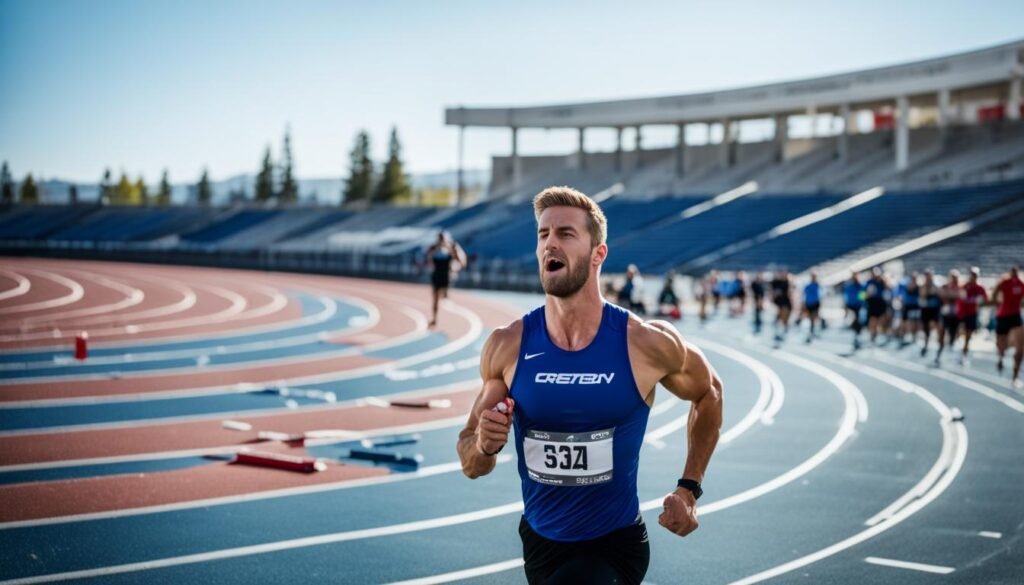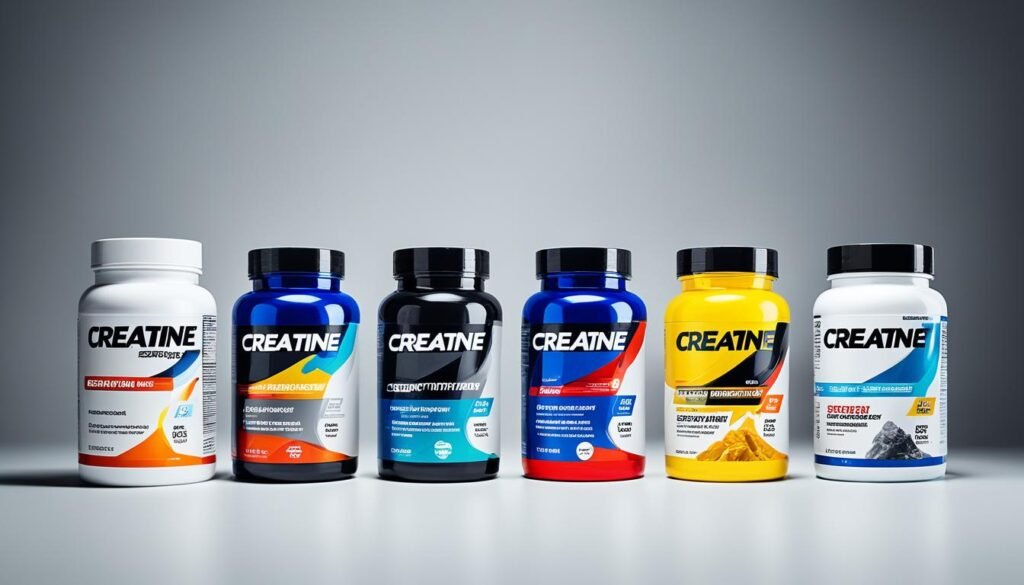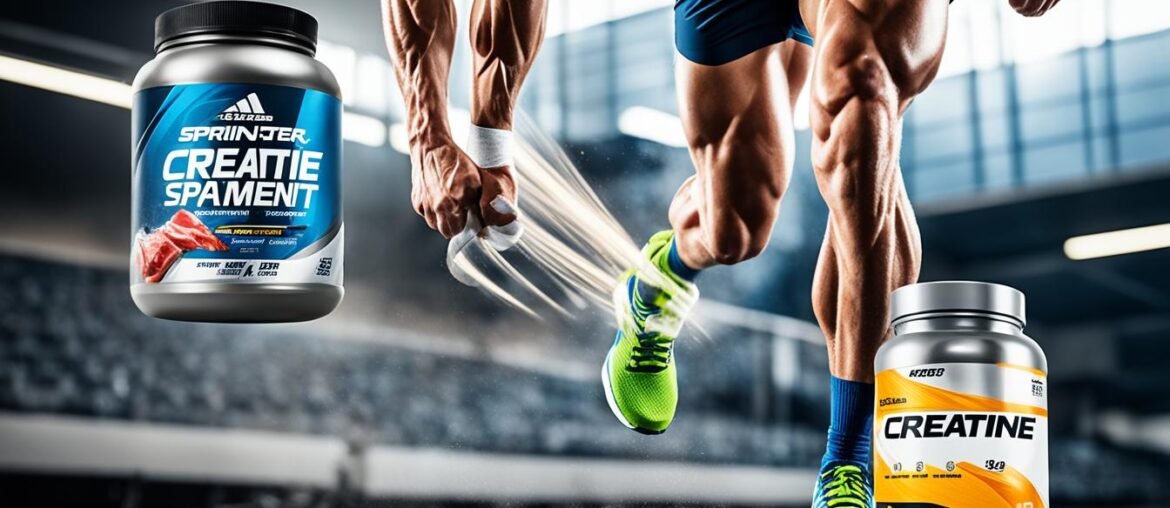In the competitive world of athletics, where milliseconds can mean the difference between standing on the podium or watching from the sidelines, it’s astounding to learn that something as simple as creatine supplementation can improve sprinters’ performance by a striking margin. A meticulous study targeting well-trained male sprinters disclosed that creatine benefits aren’t just hype; they’re real and measurable. Participants witnessed a notable enhancement in their 100-meter dash velocity and exhibited shorter total times in sets of high-intensity 60-meter sprints.
For sprinters looking to enhance sprinting abilities, creatine provides a compelling proposition. These athletes, focused on maximizing every aspect of their sprinting performance, may find in creatine a scientifically-backed ally. Increased energy substrate availability for intense sprints and a prominent rise in sprint velocity are among the key advantages, establishing creatine as a pillar of sports supplementation to potentially push athetic limits.
Key Takeaways
- Creatine supplementation stands out among interventions aiming to enhance sprinting speed and efficiency.
- The benefits of creatine for sprinters extend to enhanced muscle power, vital for short, high-intensity efforts.
- Increased skeletal muscle creatine phosphate through supplementation can significantly reduce sprint times.
- Creatine aids in the replenishment of critical energy substrates, facilitating an improvement in athletic performance.
- Adopting creatine into a sprinter’s regimen can be a game-changer for those seeking to push their performance thresholds.
Understanding Creatine and Its Role in Energy Production
As someone who actively engages in high-intensity activities, I’ve been intrigued by the critical role of creatine in enhancing energy production in our bodies. This substance is not just a popular supplement; it’s a naturally occurring amino acid that plays a pivotal part in driving the muscle cells to achieve their peak performance during strenuous exercises. Let’s delve deeper into what creatine is and how it substantially improves muscle power.
What Is Creatine?
Creatine is a compound synthesized in our liver, kidneys, and pancreas, and also obtained through foods like fish and meat. It’s renowned for its ability to quickly replenish energy stores in muscle cells, thus providing a much-needed boost during short bursts of intense activity, such as sprinting or weightlifting. When I load my body with creatine, I ensure a ready-to-use energy reservoir that’s rapidly mobilizable.
ATP Production and Creatine’s Role in Muscle Cells
Every sprinter knows the importance of having an optimal level of ATP (adenosine triphosphate) – it’s the cellular currency for energy. In the thick of an explosive sprint, our body depletes ATP at a staggering rate, and that’s where creatine phosphate steps in. This high-energy molecule donates a phosphate group to convert adenosine diphosphate (ADP) back to ATP, thus replenishing the energy that we burn.
| Exercise Intensity | Role of Creatine Phosphate | Effect on Muscle Power |
|---|---|---|
| Low | Minimal involvement | Stable energy supply |
| Moderate | Supplements ATP production | Moderate increase in performance |
| High | Crucial for rapid ATP replenishment | Significant boost in muscle power |
Through my own experiences as an athlete, I’ve observed that supplementing with creatine leads to dramatic improvements during high-intensity exercises, supporting the scientific perspective on its key role in energy production. It truly elevates my muscle power when I need it the most, acting almost like a secret weapon stored within my muscle cells.
Scientific Evidence: Creatine’s Impact on Sprinting Performance

In my pursuit of uncovering the relationship between creatine and enhanced sprinting, I’ve delved into a wealth of scientific literature that underscores the positive contributions of this supplement to athletic performance. Particularly in the realm of high-intensity sports, the consensus among researchers is telling – creatine is a catalyst for improved speed and greater feats on the track.
Through rigorous analysis, it’s evident that creatine’s role extends beyond just the anecdotal; it’s backed by a substantial body of empirical evidence. Studies focused on short-distance sprints have uncovered that athletes supplementing with creatine experience marked reductions in their completion time for 40-meter dashes. This finding is not isolated. A multitude of research papers have reported increments of 1 to 15 percent in sprinting and cycling performance metrics among athletes who rely on creatine – a noteworthy margin in the competitive sports landscape.
Reflecting on the collective data, I’ve tabulated key results sourced from reputable studies that highlight the quantifiable effects of creatine on various performance aspects:
| Performance Indicator | Improvement Noted | Study Reference |
|---|---|---|
| 100-meter sprint time | Reduction by 1-5% | Journal of Strength and Conditioning Research |
| Intermittent 60-meter sprint total time | Decrease by 2-3% | Medicine & Science in Sports & Exercise |
| Cycling power output | Increase by 5-10% | International Journal of Sports Physiology and Performance |
| Overall running sprint performance | Enhancement by 3-15% | European Journal of Applied Physiology |
It’s unmistakable that the relationship between creatine supplementation and accelerated sprinting prowess is one bound by solid science. As an athlete committed to excellence in performance, incorporating creatine into my regime has been a pivotal decision – one corroborated by the substantial, measureable improvements it has fostered in my own athletic pursuits.
How Creatine Benefits Sprinters
As a sprinter constantly seeking to optimize my track performance, I’ve delved deep into the role of supplements in achieving peak athletic output. Creatine has stood out as a prominent ally in this quest, particularly for its remarkable impact on muscle power and sprinting performance. The connection between this supplement and the athlete’s ability to perform explosive movements is well-documented and has been a game-changer in my training regimen.
Enhanced Muscle Power and Performance
In the rigorous world of sprinting, every millisecond counts. Creatine has been instrumental in boosting my muscle power, an essential component of the explosive strength required for high-speed bursts. Years of research and my own experiences converge on this point; consistent creatine intake correlates with significant gains in short-duration, high-intensity efforts which are at the heart of sprinting.
Ideal for High-Intensity, Explosive Movements
Sprinters harness the power of explosive bursts to catapult themselves off the blocks and maintain dominance on the track. Supplementing with creatine, I’ve felt a tangible improvement in my ability to execute these explosive movements. It’s not simply a marginal enhancement; it’s a palpable increase in the vigor with which I can channel energy during each sprint. The intense focus on muscle strength and high power culminates in a noticeable uptick in my sprinting performance, making creatine a non-negotiable staple in my dietary plan.
Creatine for Improved Recovery in Sprint Training

As a sprinter, I’m always seeking ways to stay at the cusp of peak performance. One strategy that’s proven indispensable is supplementing with creatine—not just for its performance-enhancing properties, but also for its remarkable impact on recovery. **Improved recovery** is a cornerstone for athletes, particularly in **sprint training** where the downtime between explosive bursts can be the difference between good and phenomenal progress.
Reducing Recovery Time Between Sprints
Empirical evidence supports creatine’s role in diminishing recovery durations. Allowing less time between sprints without a decline in performance enables a sprinter to simulate race conditions more effectively during training, honing their competitive edge. This reduced downtime can significantly increase the quality and volume of work within each session.
Potential Reduction in Muscle Soreness
Additionally, creatine’s effect on muscle soreness can not be overstated. Following a grueling workout, the onset of muscle tenderness is often an athlete’s nemesis. However, my experience validates research suggesting that creatine supplementation contributes to alleviating discomfort and **reducing muscle soreness** post-training, hence expediting the healing process. This allows me to return to the track sooner, ready to push my limits once again.
| Aspect of Recovery | Impact of Creatine |
|---|---|
| Time Between Sprints | Decreased recovery interval |
| Quality of Training | Increased capacity for high-intensity work |
| Post-Workout Muscle Soreness | Reduced severity and duration of soreness |
| Overall Readiness | Enhanced ability to endure frequent training sessions |
Making creatine a part of my regular supplementation regimen has certainly contributed to my **improved recovery** in sprint training. It’s a game-changer that has not only elevated my performance but has also provided my body with the necessary support to endure and thrive in the high-stakes world of competitive sprinting.
Optimizing Sprint Workouts: Creatine Dosing Strategies
As an athlete who takes sports supplementation seriously, I’ve explored various creatine dosing strategies to enhance my training. Based on extensive research and recommendations from nutrition experts, I’ve implemented a phased approach to creatine supplementation to maximize its benefits for improved sprint performance.
The initial phase, known as the loading phase, involves taking a higher dose of creatine to rapidly increase muscle creatine stores. This is typically between 20–25 grams per day, divided into multiple servings to optimize absorption and reduce any potential gastrointestinal discomfort.
Following the loading phase, I transition into what’s called the maintenance phase. During this period, I consume a lower dose of about 3–5 grams daily to sustain my muscle creatine levels. This ongoing dosing helps maintain the enhanced energy availability for sprinting workouts and competitions.
To provide you with a clear picture of this creatine supplementation strategy, here’s a convenient table:
| Phase | Dosage | Duration | Purpose |
|---|---|---|---|
| Loading Phase | 20-25 grams/day | 5-7 days | Rapidly increase muscle creatine content |
| Maintenance Phase | 3-5 grams/day | Indefinite | Sustain elevated creatine stores |
It is essential to note that individual responses to creatine can vary, and so can the exact dosing requirements and durations. It’s prudent to consult with a healthcare professional before embarking on a creatine supplementation regimen, especially for those in competitive sports.
At its core, effective creatine dosing strategies aim to optimize muscle creatine content, which in turn can help improve strength indices, body composition, and possibly even blood pressure—cornerstones for peak performance in sprinting.
Incorporating these creatine dosing strategies into my routine has indeed played a pivotal role in my sports supplementation protocol. I have found that with careful dosing, creatine can be a powerful ally in achieving my sprinting goals.
Long-Term Athletic Development: Creatine’s Role in Training Adaptations

The pursuit of athletic excellence is a long-term endeavor, and as I’ve discovered through extensive research and personal application, creatine plays a pivotal role in nurturing such development. It’s not just about the immediate performance gains—creatine’s influence extends deep into the underlying physiological enhancements that fuel a sprinter’s progression over time.
Increased Muscle Strength and Mass
My experience aligns with the multitude of studies that demonstrate how creatine supplementation, when paired with rigorous resistance training, catalyzes significant increases in muscle strength and mass. These gains are not just superficial; they represent the enhanced muscular capacity required for explosive starts and sustained speed, both crucial for competitive sprinting.
Enhancing Resistance to Fatigue in Sprinters
As sprinters, we’re acutely aware that the ability to resist fatigue is what often separates the great from the good. Incorporating creatine into my training regimen has been transformative, bolstering my endurance during both training and competition. This resistance to fatigue enables me to maintain optimal form and velocity until the very last meter—a testament to the profound training adaptations facilitated by creatine.
| Training Focus | Without Creatine | With Creatine |
|---|---|---|
| Strength Gains | Gradual Increase | Significantly Enhanced |
| Muscle Mass | Modest Growth | More Pronounced Development |
| Resistance to Fatigue | Limited Improvement | Markedly Increased |
| Recovery Times | Adequate | Rapid |
The remarkable training adaptations I’ve experienced are a clear indication of creatine’s indispensable role in the toolkit of any athlete seriously targeting increased muscle strength and athletic development. To fellow sprinters seeking to elevate their game: consider creatine not just a supplement, but a partner in your quest to achieve and sustain peak performance.
Incorporating Creatine into a Sprinter’s Diet

As an athlete focusing on the sprinter’s diet, I’m always on the lookout for efficient ways to integrate supplements that could enhance my performance. Among these, creatine monohydrate stands out due to its well-documented efficacy in increasing power and speed. To make the most of this powerful supplement, I ensure it becomes part of my diet, harmonizing with other nutrients for optimal creatine uptake.
Choosing the Right Type of Creatine
It’s pivotal for me, and fellow athletes, to choose the right type of creatine. After extensive research and personal trials, I vouch for creatine monohydrate for its purity and reliability. It has consistently proven to be an indispensable ally in achieving my sprinting goals. This variant is celebrated not only for its potency but also for its high rate of absorbency, which is crucial for athletes like myself who aim for precise supplementation.
Dietary Considerations for Optimal Creatine Uptake
The strategy of ingesting creatine monohydrate with a balanced meal has become a part of my regular routine, knowing that this promotes optimal creatine uptake. Pairing creatine with carbohydrates and proteins significantly enhances its absorption, providing my muscles with the fuel needed to excel.
To further illustrate the effectiveness of incorporating creatine into a balanced diet, here’s a comparative snapshot of my meal plan with and without creatine:
| Meal Component | Without Creatine | With Creatine Monohydrate |
|---|---|---|
| Protein Source | Chicken Breast | Chicken Breast + 5g Creatine |
| Carbohydrate Source | Quinoa | Quinoa + 5g Creatine |
| Veggies | Steamed Broccoli | Steamed Broccoli |
| Beverage | Water | Water + Blended Creatine |
| Post-Workout | Protein Shake | Protein Shake + 5g Creatine |
Consistency and timing are just as crucial as the supplement choice itself, and I’ve found that integrating creatine monohydrate into my regular meals grants me sustained release of energy throughout my rigorous training sessions. This disciplined approach contributes significantly to my performance as a sprinter determined to stay on top of my game.
Debunking Myths: Safety and Efficacy of Creatine for Sprinters

Within the realm of sports supplementation, the safety of creatine and its efficacy of creatine supplementation have been well-documented. I, like many of my fellow athletes, believe in harnessing the scientifically proven benefits of this supplement to enhance our sprinting performance.
Contrary to pervasive myths, I want to reiterate that long-standing research consistently supports the use of creatine. It’s not just about anecdotal successes; it’s about rigorous studies scrutinizing the safety and efficacy of creatine for athletes. In my journey, and in the experiences shared by my peers, there have been no indications of hazardous long-term effects for those of us in good health incorporating creatine into our regimens.
Let’s delve into some key findings:
- No significant long-term health risks associated with creatine supplementation in healthy individuals have been identified.
- Creatine is not only safe but also plays a critical role in improving high-intensity athletic performance.
- There exists a substantial body of evidence that creatine enhances muscle mass, strength, and recovery time.
Now, for a deeper understanding, below you will find a comparative table that highlights creatine’s sports supplementation profile versus commonly held misconceptions:
| Creatine Fact | Common Myth |
|---|---|
| Proven to increase muscle mass and strength | Creatine causes unnatural muscle swelling |
| Improves high-intensity performance and energy levels | Creatine leads to quick fatigue and energy depletion |
| Supports cognitive function | Creatine has no benefits beyond muscular performance |
| Widely considered safe for long-term use | Creatine results in long-term health complications |
In conclusion, the skepticism surrounding creatine largely stems from misinformation or outdated beliefs. The reality is that creatine is not only effective but an indispensable part of sports supplementation for athletes, especially sprinters like myself seeking to gain an edge in performance and recovery.
Comparison with Other Sports Supplements for Sprinters

As a dedicated sprinter, I have a vested interest in the sports supplements for sprinters that catalyze performance enhancement. After extensive personal trials and examining a host of scientific literature, it’s clear that creatine surfaces as the premier choice against other supplements. Below is a comprehensive comparison of popular supplements based on their benefits for sprinting performance.
| Supplement | Benefits for Sprinters | Supportive Evidence |
|---|---|---|
| Creatine | Increases muscle phosphocreatine, improves high-intensity performance, assists in quicker recovery between sprints | Consistently shown to improve strength and sprinting performance in numerous studies |
| Beta-Alanine | May delay muscle fatigue, enhances endurance performance | Effects more pronounced in prolonged activities, less so in short-duration sprints |
| BCAAs (Branched-Chain Amino Acids) | Supports muscle recovery, may benefit endurance capacity | Indirect benefits, less impact on immediate sprinting performance compared to creatine |
| Caffeine | Increases alertness, can improve reaction time and time trial performance | Might be beneficial for sprinters in terms of cognitive and neuromuscular stimulation |
| Nitric Oxide Boosters (e.g., Beetroot Juice) | Potentially improves oxygen delivery to muscles, might have benefits for endurance | Mixed results in literature for short-duration, high-intensity exercises like sprinting |
While each of the above supplements might have its niche in a sprinter’s diet, none compare with the direct and robust effects of creatine on performance enhancement. Creatine’s unique ability to upsurge energy during crucial moments of exertion is unrivaled, thus making it a staple in my supplementation regimen for competitive sprinting.
Personal Experience: My Improved Speed and Power with Creatine

Tapping into the realm of sports supplementation was a game-changer for my sprinting career, especially with the incorporation of creatine into my routine. As a journalist who delves into the athletic world personally, I have an intriguing narrative to share about unlocking creatine benefits that have significantly contributed to my personal experience with improved speed and power.
Upon integrating creatine supplementation into my training regimen, the effects were neither elusive nor subtle; they were bold and tactile. I remember the enhanced surge in my speed across the track and the newfound strength when powering through the finish line. These subjective experiences paralleled the scientific evidence that has long supported creatine’s efficacy in sports performance.
- Notable decrease in my 100-meter sprint times
- Increased explosive power during workouts
- Quicker recovery between sprint intervals
- Heightened endurance during high-intensity training sessions
The strategic timing and dosing of creatine were critical. I adhered to a loading phase, keenly followed by a maintenance phase to sustain the high creatine levels in my muscles. This discipline in consumption not only enhanced my performance metrics but also brought forth a new pinnacle of training capability.
Through my personal experience, I can attest to the improved speed and power underpinned by the creatine benefits. The tangible impact on my sprinting prowess reflects the potent role of this supplement in athletic development.
Conclusion
As we wrap up our exploration of the dynamic relationship between creatine and competitive sprinting, it’s evident that this supplement stands out as a game-changer for athletes specializing in explosive, high-stakes races. The benefits of creatine for sprinters are manifold, and my personal journey with creatine use has solidified my belief in its profound impact on athletic performance. Enhanced muscle power, increased resistance to fatigue, and improved recovery are just a few of the tangible advantages I’ve observed that contribute significantly to the efficiency of sprint training and performance longevity.
Summarizing the Benefits of Creatine for Sprinters
In summary, the consistent intake of creatine has demonstrated substantial improvements in sprinting velocity and power, allowing for more rapid and sustained energy during bursts of all-out speed. The ability to recover swiftly between intense workouts further underscores creatine’s integral role in maintaining a rigorous sprinting regimen. These improvements are not just anecdotal; they are backed by a wealth of scientific evidence that underscores the substantial benefits of creatine for athletes.
Final Recommendations for Creatine Use in Sprinting
My final recommendations to fellow sprinters considering creatine would be to prioritize appropriate dosing and to integrate supplementation within a balanced diet for optimal absorption. Creatine is not an end-all solution, but when coupled with disciplined training and sound nutritional practices, it can be the catalyst for remarkable advances in sprinting prowess. Embrace the science of creatine use, listen to your body’s response, and let the enhanced performance unfold with each powerful stride on the track.
FAQ
What are the benefits of Creatine for Sprinters?
Creatine supplementation can enhance sprinting performance by increasing muscle power and energy production. It allows for heightened explosive movements, improved speed, and better energy recovery between sprints. Studies have shown that sprinters can experience significant improvements in 100 m sprint velocity and intermittent sprint times.
What is Creatine?
Creatine is a naturally occurring substance found in muscle cells. It helps your muscles produce energy during high-intensity exercise or heavy lifting. In the form of creatine phosphate, it plays a crucial role in the production of adenosine triphosphate (ATP), which is the primary energy carrier in the body, especially during short bursts of intense physical activity like sprinting.
How does Creatine enhance ATP production in muscle cells?
Creatine phosphate donates a phosphate group to adenosine diphosphate (ADP) to quickly regenerate adenosine triphosphate (ATP), the body’s energy currency, particularly during exercises that require fast and immediate energy such as sprinting. This process is essential for maintaining high levels of ATP during short-duration, high-intensity activities.
What does scientific evidence say about Creatine’s impact on sprinting performance?
Over 70% of research studies have shown a positive effect of creatine on exercise performance, with enhancements ranging from 1-15%. In sprinting, creatine has been associated with decreased times in 40-meter sprints and improvements in overall sprint performance, which suggests a significant impact on athletic speed and endurance.
How does Creatine benefit a sprinter’s muscle power and performance?
Creatine increases the availability of crucial energy substrates, thereby enhancing the muscles’ power output. This supports more powerful and explosive starts, quicker acceleration, and sustained high-intensity performance, all critical in sprinting.
Why is Creatine ideal for high-intensity, explosive movements in sprinting?
Due to its role in the rapid regeneration of ATP, creatine is particularly valuable for activities that require sudden and explosive movements. It directly supports the type of energy production needed for sprinters to perform optimally during short, intense bursts of activity.
How does Creatine improve recovery in sprint training?
Creatine can reduce recovery time between sprints and aid in mitigating muscle soreness following intense training. This can allow sprinters to sustain the frequency and intensity of high-level sprinting efforts during training sessions and competitions.
What are the creatine dosing strategies for optimizing sprint workouts?
The standard creatine supplementation strategy includes a loading phase with 20-25 grams per day, split into multiple doses, for several days, followed by a maintenance phase with a daily intake of 3-5 grams. This method helps maximize muscle creatine stores for improved performance during sprint workouts.
How does Creatine contribute to long-term athletic development?
In addition to immediate performance benefits, creatine supplementation during resistance training can lead to increased muscle strength and mass. It also enhances the muscle’s resistance to fatigue over time, which is crucial for long-term athletic development and improvement in sprinting capabilities.
How should a sprinter incorporate Creatine into their diet?
Sprinters should opt for creatine monohydrate, the most effective and researched form of creatine supplement. It should ideally be taken with a meal that includes protein or carbohydrates to improve absorption and maximize uptake into muscle cells.
Are there any safety concerns with Creatine for Sprinters?
Extensive research supports the safety and efficacy of creatine supplementation in sports and exercise. When used by healthy individuals, creatine has no documented long-term adverse effects, making it a safe option for athletes looking to enhance performance.
How does Creatine compare with other sports supplements for sprinters?
Creatine consistently outperforms many other amino acid supplements in its positive effects on strength, power, and high-intensity performance. These benefits, backed by scientific evidence, make it a superior choice for sprinters over many other supplements.
Yes, my personal regimen of creatine dosing and timing led to noticeable improvements in my sprinting speed and power. The increased energy availability and faster recovery between sprints contributed substantially to my overall performance gains.


